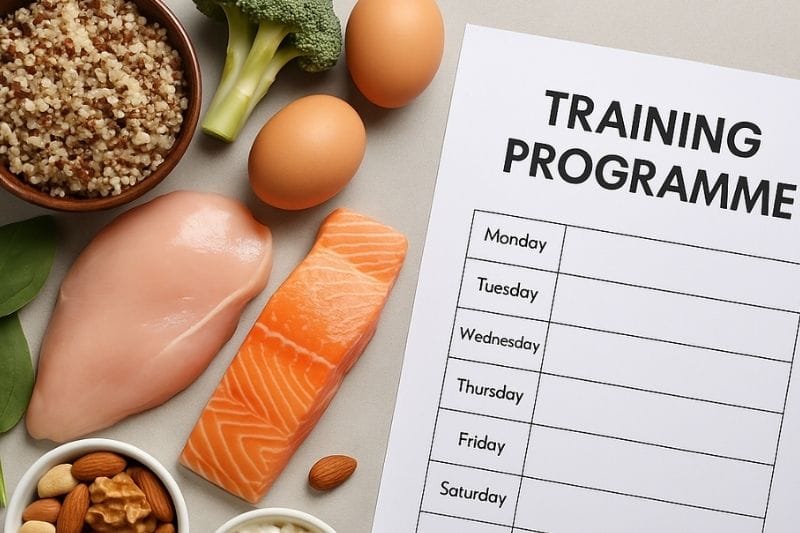GLP-1 medications like Ozempic, Wegovy and Mounjaro do not directly improve sports performance, even though they are becoming popular among some athletes and gym-goers for weight loss. These drugs can help reduce body fat by suppressing appetite, which may benefit sports where weight matters, such as running or cycling. However, they also carry risks, including muscle loss, low energy and slower recovery, which can harm strength and endurance.
This blog explains what GLP-1 drugs are, why they are trending in sport, the potential benefits, and the downsides athletes need to consider.
This article is not about people using GLP-1 medications under medical supervision for weight loss; it is specifically focused on their use in sport and the gym, and how they may affect performance. So let’s find out more.
What Are GLP-1 Medications?
GLP-1 stands for glucagon-like peptide-1, a hormone that helps control appetite and blood sugar. These medications mimic the effects of that hormone. They slow digestion, make you feel fuller for longer and reduce hunger.
The most well-known brands include:
- Ozempic – weekly injection mainly used for diabetes but often associated with weight loss
- Wegovy – similar to Ozempic but marketed for weight loss
- Mounjaro – works on two receptors, GLP-1 and GIP, for blood sugar and appetite control
- Saxenda – an earlier medication requiring daily injections
None of these drugs were developed for sports performance. Yet they are now part of fitness conversations.
Why Are Athletes and Gym-Goers Using GLP-1s?
The main reason is weight loss. In sports where body weight matters, such as running, cycling or gymnastics, being lighter can feel like an advantage. For some gym-goers and endurance athletes, the idea of losing fat without battling hunger is very appealing.
Social media has played a big role in this trend, with influencers and celebrities promoting rapid weight loss using GLP-1 drugs.
There is even talk of micro-dosing, which means taking smaller doses than prescribed. The goal is appetite control without strong side effects. However, this is not supported by research and comes with unknown risks. I’ll go into more detail about this as you read on.
Are There Performance Benefits?
On the surface, losing excess fat could improve:
- Running and cycling efficiency
- Joint comfort and mobility
- Cardiovascular performance
But weight loss does not always equal better performance. For athletes, there are trade-offs that need serious consideration.
How GLP-1 Medications Affect Calorie Intake and Performance
One of the main reasons GLP-1 drugs like Ozempic and Wegovy lead to weight loss is that they dramatically reduce appetite. For many people, food intake drops by 30% or more, which can easily create a deficit of 800 to 1,500 calories per day. In some cases, especially early on, people unintentionally eat less than 1,200 calories a day.
While this might sound like a fast track to fat loss, it comes with a major trade-off for athletes and gym-goers: fuel availability. Training requires energy, and a big calorie deficit can quickly lead to:
- Depleted glycogen stores, making training sessions harder
- Lower intensity during strength training
- Slower recovery between sessions
- Increased risk of losing lean muscle, even with resistance training
For performance-based goals, this is a problem. A deficit this large means your body starts breaking down muscle tissue for energy, hormone balance can shift, and your ability to recover and adapt to training declines.
Why Bigger Calorie Deficits Hurt Athletes More
A moderate deficit of 300–500 calories per day is usually enough for steady fat loss without hurting performance. But on GLP-1 drugs, deficits are often far higher, which can make athletes feel constantly fatigued and under-fuelled. For endurance athletes or anyone lifting heavy, this is a recipe for slower progress and higher injury risk.
In short, the very thing that makes GLP-1 drugs so effective for weight loss – appetite suppression – can be a major disadvantage for anyone trying to train hard or compete.
What is Micro-Dosing GLP-1 and Does it Work?
Some athletes and gym-goers have started experimenting with micro-dosing GLP-1 medications. This means taking much smaller doses than those recommended for medical use, with the aim of getting appetite control without the strong side effects or extreme calorie drop that often happens on a full dose.
The idea is simple:
- A standard dose can lead to nausea, fatigue and a very large calorie deficit.
- A smaller dose might make you slightly less hungry, while still allowing you to eat enough to fuel training.
Sounds appealing, right? But here’s the problem:
- No research exists on micro-dosing GLP-1 for athletes. The clinical trials focus on diabetes and obesity, not on people trying to optimise performance.
- Dosing guidelines are designed for medical outcomes, not for fine-tuning body composition in sports.
- Results are unpredictable. A tiny dose might do nothing, or it could still cause side effects and a big drop in energy intake.
In short, micro-dosing is an experiment with unknown risks. Without proper evidence or medical supervision, athletes are effectively guessing how their body will respond.
The Overall Risks and Downsides
1. Muscle Loss
Rapid weight loss often means losing muscle as well as fat. GLP-1 drugs can increase this risk. For athletes, less muscle means less strength, power and endurance.
2. Low Energy
These medications reduce appetite, so eating enough to fuel hard training becomes difficult. Under-eating can lead to fatigue and poor performance.
3. Side Effects
Common issues include nausea, constipation and bloating. These can make regular training uncomfortable.
4. Nutrient Deficiencies
Eating less often means missing out on key nutrients, which affects recovery, immunity and long-term health.
5. Ethical Concerns
GLP-1 drugs are not banned by anti-doping bodies yet, but questions are being raised about fairness and whether they give an unfair edge.
Should Athletes Use GLP-1 Medications?
For most athletes and gym-goers, the answer is probably no, unless there is a genuine medical need and it is supervised by a doctor. Here is why:
- These drugs can reduce strength, energy and recovery
- They were not designed for athletes and can disrupt performance
Instead, focus on:
- Resistance training to protect muscle
- Adequate protein and energy intake
- Gradual, sustainable fat loss
- Getting mental health or comfort eating support if emotional eating is part of the challenge
Key Takeaways
- Always speak to a doctor before considering any medication
- Do not sacrifice strength and energy just to weigh less
- Focus on habits that support health and long-term performance
GLP-1 drugs like Ozempic and Wegovy can be life-changing for some people, but they are not a shortcut for fitness or sport. They carry risks that may harm your performance more than they help.
GLP-1 and Sport Summary FAQs
1. Are GLP-1 drugs like Ozempic and Wegovy allowed in sport?
Currently, GLP-1 medications are not banned by major anti-doping agencies such as WADA. However, this could change as their use in athletic populations grows and ethical discussions continue.
2. Can GLP-1 drugs improve sports performance?
Not directly. While weight loss can benefit some athletes in certain sports, GLP-1 drugs can also reduce energy, strength and recovery capacity. These side effects may outweigh any perceived benefits.
3. Do GLP-1 medications cause muscle loss?
Yes, rapid weight loss often includes muscle loss. This is true of any “crash” diet – with or without GLP-1s. Athletes using GLP-1 drugs without carefully managing protein intake and resistance training risk losing strength and power.
4. Is micro-dosing GLP-1 medications safe for athletes?
There is no scientific evidence to support micro-dosing for performance or appetite control in athletes. This approach carries unknown risks and is not recommended without medical supervision.
5. Should gym-goers consider GLP-1 for fat loss?
For most people training for fitness or aesthetics, the risks are likely to outweigh the benefits. There are safe, sustainable strategies for fat loss through diet and exercise without compromising performance or health.
6. Are GLP-1 drugs like Ozempic and Wegovy suitable for bodybuilders?
Generally no. GLP-1 medications can reduce appetite, making it difficult to consume enough calories and protein to maintain or build muscle mass, which is essential for bodybuilding.
7. Do GLP-1 medications impact recovery after training?
Yes, they can. Lower calorie and protein intake due to appetite suppression can slow recovery and increase the risk of fatigue and injury over time.
8. Can GLP-1 medications affect endurance training?
Yes. While carrying less body weight might improve running or cycling efficiency, under-fuelling due to reduced appetite can hurt endurance performance, especially in longer sessions.
9. Are GLP-1 medications a banned substance in professional sports?
Not currently, but this could change. There is growing debate about whether their use provides an unfair advantage or poses long-term health risks to athletes.
10. Is it possible to maintain performance while taking GLP-1 drugs?
It can be very challenging. Athletes would need careful nutrition planning to maintain muscle and energy intake. Even then, side effects like nausea can make training inconsistent.
This article is not medical advice. Always consult your doctor or a qualified health professional before considering any medication.
I can help you…
I am a Weight Loss Coach, successfully helping people just like you to lose weight and keep it off:
I am a Fitness, Strength and Nutrition Coach for sports events and athletes – helping people like you to get fitter, stronger and faster:
Want to get stronger, fitter or gain muscle?




